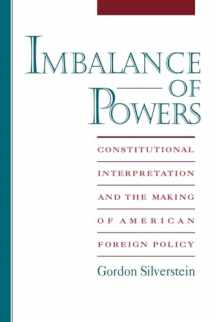
Imbalance of Powers: Constitutional Interpretation and the Making of American Foreign Policy
Book details
Summary
Description
The Vietnam War and the Watergate aftermath made it apparent that the increase in executive power which followed World War II needed to be redressed. Congress tried to balance the separation of powers by passing a number of laws that were designed to assert legislative authority in foreign policy. However, the efforts by Congress to achieve its stated objectives consistently failed. Using the struggle over power and control of American foreign policy, Silverstein details the interaction of the executive, legislative, and judicial branches, and traces the altering of the constitutional touchstone of separation of powers. The book argues that although it is unrealistic to expect members of Congress or the Supreme Court Justices to change their behavior, either toward the executive branch or toward one other, it is in the President's best political interest to encourage a legislative role in foreign policy decisions. Demonstrating the importance of studying both the legal and political process, and the ways in which they influence each other, Silverstein contends that an understanding of American foreign policy requires an awareness of the way in which constitutional interpretation shapes and constrains foreign policy decisions. This volume will be of interest to all students of American foreign policy, constitutional analysis, and American government, as well as to politicians and informed readers with an interest in contemporary politics and constitutional debate.


We would LOVE it if you could help us and other readers by reviewing the book
Book review



